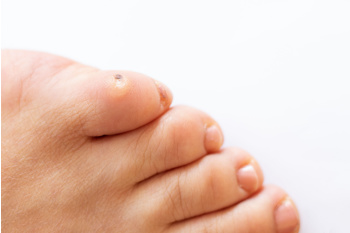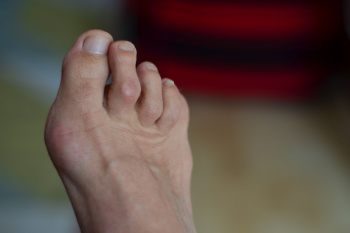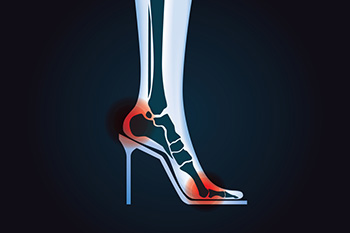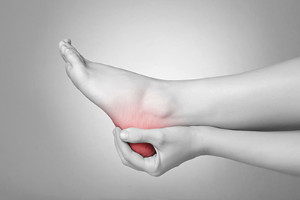September 2024

Corns are small, thickened areas of skin that develop on children's feet due to pressure or friction, often caused by wearing poorly fitting shoes. They typically appear on the tops or sides of toes or on the soles. While not usually dangerous, corns can cause discomfort or pain, especially when walking. To manage corns, parents should ensure their child's shoes fit properly, offering enough room for toes to move freely. If a child has diabetes or circulation issues, complications from corns can develop as their feet may be more vulnerable to infections or other foot problems. It is suggested that you consult a podiatrist if the corn persists or worsens.
Corns can make walking very painful and should be treated immediately. If you have questions regarding your feet and ankles, contact one of our podiatrists of Comprehensive Foot & Ankle Center of South Jersey. Our doctors will treat your foot and ankle needs.
Corns: What Are They? And How Do You Get Rid of Them?
Corns are thickened areas on the skin that can become painful. They are caused by excessive pressure and friction on the skin. Corns press into the deeper layers of the skin and are usually round in shape.
Ways to Prevent Corns
There are many ways to get rid of painful corns such as:
- Wearing properly fitting shoes that have been measured by a professional
- Wearing shoes that are not sharply pointed or have high heels
- Wearing only shoes that offer support
Treating Corns
Although most corns slowly disappear when the friction or pressure stops, this isn’t always the case. Consult with your podiatrist to determine the best treatment option for your case of corns.
If you have any questions please feel free to contact our offices located in Cherry Hill, Voorhees, Atco, and Turnersville, NJ . We offer the newest diagnostic and treatment technologies for all your foot and ankle needs.

Hammertoe is a condition where one or more toes bend abnormally at the middle joint, resembling a hammer. This deformity often causes the affected toe to curl downward rather than lie flat. Symptoms include pain and discomfort, especially when wearing tight or ill-fitting shoes. Hammertoes also cause the formation of corns or calluses on the toe or the top of the joint as it rubs against the shoe. Hammertoe typically results from muscle imbalances or imbalances in the tendons that control toe movement. Contributing factors include wearing high heels or shoes with inadequate room for toes, genetic predisposition, and conditions such as arthritis or diabetes. If you notice signs of hammertoe, it is suggested that you promptly visit a podiatrist who can offer effective treatment solutions.
Hammertoe
Hammertoes can be a painful condition to live with. For more information, contact one of our podiatrists from Comprehensive Foot & Ankle Center of South Jersey. Our doctors will answer any of your foot- and ankle-related questions.
Hammertoe is a foot deformity that affects the joints of the second, third, fourth, or fifth toes of your feet. It is a painful foot condition in which these toes curl and arch up, which can often lead to pain when wearing footwear.
Symptoms
- Pain in the affected toes
- Development of corns or calluses due to friction
- Inflammation
- Redness
- Contracture of the toes
Causes
Genetics – People who are genetically predisposed to hammertoe are often more susceptible
Arthritis – Because arthritis affects the joints in your toes, further deformities stemming from arthritis can occur
Trauma – Direct trauma to the toes could potentially lead to hammertoe
Ill-fitting shoes – Undue pressure on the front of the toes from ill-fitting shoes can potentially lead to the development of hammertoe
Treatment
Orthotics – Custom made inserts can be used to help relieve pressure placed on the toes and therefore relieve some of the pain associated with it
Medications – Oral medications such as anti-inflammatories or NSAIDs could be used to treat the pain and inflammation hammertoes causes. Injections of corticosteroids are also sometimes used
Surgery – In more severe cases where the hammertoes have become more rigid, foot surgery is a potential option
If you have any questions please contact our offices located in Cherry Hill, Voorhees, Atco, and Turnersville, NJ . We offer the newest diagnostic and treatment technologies for all your foot and ankle needs.

Wearing high heels can lead to several negative side effects affecting the feet. The elevated position of the heel places excessive pressure on the toes and the balls of the feet, often causing pain and discomfort. This pressure can result in conditions such as bunions, hammertoes, and calluses. Additionally, the unnatural foot position associated with high heels disrupts proper foot alignment, leading to potential issues with balance and gait. Over time, wearing high heels can contribute to joint and muscle strain, leading to chronic pain in the feet, knees, and lower back. To minimize these effects, it is important to balance high-heel wear with comfortable, supportive footwear and practice foot care routines that alleviate pressure and promote foot health. If you have developed a foot condition from frequently wearing high heels, it is suggested that you consult a podiatrist who can offer you effective relief strategies.
High heels have a history of causing foot and ankle problems. If you have any concerns about your feet or ankles, contact one of our podiatrists from Comprehensive Foot & Ankle Center of South Jersey. Our doctors can provide the care you need to keep you pain-free and on your feet.
Effects of High Heels on the Feet
High heels are popular shoes among women because of their many styles and societal appeal. Despite this, high heels can still cause many health problems if worn too frequently.
Which Parts of My Body Will Be Affected by High Heels?
- Ankle Joints
- Achilles Tendon – May shorten and stiffen with prolonged wear
- Balls of the Feet
- Knees – Heels cause the knees to bend constantly, creating stress on them
- Back – They decrease the spine’s ability to absorb shock, which may lead to back pain. The vertebrae of the lower back may compress.
What Kinds of Foot Problems Can Develop from Wearing High Heels?
- Corns
- Calluses
- Hammertoe
- Bunions
- Morton’s Neuroma
- Plantar Fasciitis
How Can I Still Wear High Heels and Maintain Foot Health?
If you want to wear high heeled shoes, make sure that you are not wearing them every day, as this will help prevent long term physical problems. Try wearing thicker heels as opposed to stilettos to distribute weight more evenly across the feet. Always make sure you are wearing the proper shoes for the right occasion, such as sneakers for exercising. If you walk to work, try carrying your heels with you and changing into them once you arrive at work. Adding inserts to your heels can help cushion your feet and absorb shock. Full foot inserts or metatarsal pads are available.
If you have any questions please feel free to contact our offices located in Cherry Hill, Voorhees, Atco, and Turnersville, NJ . We offer the newest diagnostic and treatment technologies for all your foot and ankle needs.

Heel pain can stem from various causes, each requiring a different approach for relief. One common cause of heel pain is plantar fasciitis, where inflammation of the tissue along the bottom of the foot leads to sharp heel pain. Another possibility is Achilles tendinitis, which affects the tendon that connects the calf muscle to the heel. Stress fractures or heel spurs can also contribute to discomfort. Additionally, poor footwear, excessive physical activity, and obesity can increase heel pain. Finding relief often involves a combination of strategies. Resting the foot and taking mild pain relievers can reduce inflammation. Stretching exercises for the Achilles tendon and plantar fascia can improve flexibility. Supportive footwear and orthotic inserts can provide additional comfort. If you have heel pain, it is suggested that you schedule an appointment with a podiatrist who can determine the cause and treat it accordingly.
Many people suffer from bouts of heel pain. For more information, contact one of our podiatrists of Comprehensive Foot & Ankle Center of South Jersey. Our doctors can provide the care you need to keep you pain-free and on your feet.
Causes of Heel Pain
Heel pain is often associated with plantar fasciitis. The plantar fascia is a band of tissues that extends along the bottom of the foot. A rip or tear in this ligament can cause inflammation of the tissue.
Achilles tendonitis is another cause of heel pain. Inflammation of the Achilles tendon will cause pain from fractures and muscle tearing. Lack of flexibility is also another symptom.
Heel spurs are another cause of pain. When the tissues of the plantar fascia undergo a great deal of stress, it can lead to ligament separation from the heel bone, causing heel spurs.
Why Might Heel Pain Occur?
- Wearing ill-fitting shoes
- Wearing non-supportive shoes
- Weight change
- Excessive running
Treatments
Heel pain should be treated as soon as possible for immediate results. Keeping your feet in a stress-free environment will help. If you suffer from Achilles tendonitis or plantar fasciitis, applying ice will reduce the swelling. Stretching before an exercise like running will help the muscles. Using all these tips will help make heel pain a condition of the past.
If you have any questions please contact our offices located in Cherry Hill, Voorhees, Atco, and Turnersville, NJ . We offer the newest diagnostic and treatment technologies for all your foot and ankle needs.

